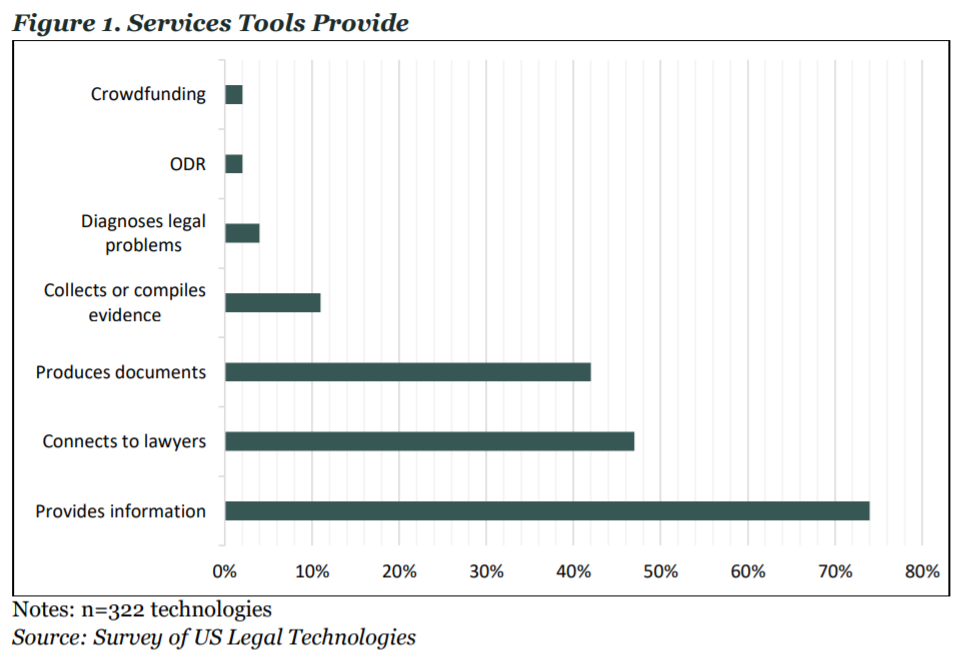With many U.S. citizens unable to afford legal representation, can legal technology be leveraged to improve access to justice for low-income individuals?
It’s become an unfortunate fact in our country and around the world that low-income families and individuals often can’t financially afford to get the legal help they need. According to a 2017 study by the Legal Services Corporation (LSC), 86% of the civil legal problems reported by low-income Americans in a year received inadequate or no legal help.
The lack of access to justice can have serious adverse effects on individuals’ lives. One example of this is seen in disputes that arise over rental housing, where low-income tenants are typically up against landlords that can afford an attorney. According to the LSC study, 29% of tenants experienced a legal issue within the last year, including where landlords failed to provide basic services or repairs (affecting 16% of rental households) and tenants that live in unsafe rental housing (9%). Legal disputes over rental housing may also lead to eviction, which seriously disrupts the lives of individuals and families.
This study and others like it highlight the staggering number of legal problems that do not make it into courts or other formal legal institutions. The studies also underscore how these problems cause serious adverse effects to the people who experience them.
In many cases, however, legal technology can be leveraged to improve access to justice for low-income individuals. Some organizations have started to use legal tech to improve access to justice and are seeing great results, making an impact, and paving the way for other law firms and organizations. According to the Survey on US Legal Technologies, which identified more than 300 technologies that assist with access to justice problems for non-lawyers in U.S. jurisdictions, the most common uses of legal tech for access to justice issues are: (i) technology that provides information; (ii) technology that connects individuals to attorneys; and (iii) technology that automates and produces documents.

This article provides an overview of how those three uses of legal tech are being leveraged today to improve access to justice for all.
Providing Online Legal Information
The most common way legal technology is used to address the access to justice problem is by delivering key legal information and self-help tools online for attorneys and individuals. Organizations like ProBono.net provide free online legal guidance for attorneys taking on pro bono matters. ProBono.net offers searchable libraries of practice resources built and maintained by public interest organizations and law firms throughout the country. Their website is organized by geographic regions and topical practice areas, like housing, LGBT, and asylum law.
Law firm attorneys can use this information to take on pro bono cases in areas they’re not familiar with. For example, while many corporate attorneys aren’t used to navigating the housing court system, with the right guidance they may feel more comfortable taking on a pro bono housing case.
Connecting Individuals to Attorneys
Technology is also used to connect individuals that need legal help to attorneys at legal aid organizations and law firms. Tech nonprofit AsylumConnect is leveraging open source technology to connect LGBTQ asylum seekers with verified LGBTQ- and immigrant-friendly lawyers and other service providers in the United States, Canada and Mexico.
A user can go to AsylumConnect’s website, enter their location and need (e.g., help with their asylum application), and they’ll get a list of organizations that can help them in their area.
Technology is also used to connect individuals to attorneys for online advice. The ABA Free Legal Answers site offers a virtual legal advice clinic. Qualifying users post their civil legal question to their state’s website, and attorney volunteers that are authorized to provide pro bono assistance in their state can log in to answer questions and provide legal information and advice online.
Document Automation
A smaller number of law firms and organizations are leveraging document automation to improve the access to justice problem for debt collection, asylum, and transgender name changes. With document automation technology, law firms and organizations turn documents into easy-to-use web-based questionnaires that individuals and attorneys can use to generate the forms they need.
In Australia, the law firm Gilbert & Tobin partnered with the Refugee Advice and Casework Service (RACS) to develop a document automation and workflow technology platform using Thomson Reuters Contract Express to automate and support asylum seeker applications. This enabled RACS to assist more asylum seekers than before and improved their capacity to manage a high volume of applications quickly and efficiently. “This is particularly game-changing at a time when all NGO’s face intense resource and funding restraints that make it difficult for them to invest in commercial technology solutions,” said Peter Dombkins, the firm’s Head of Legal Project Management who led the project.
In the U.S., organizations like the Colorado Name Change Project and the Florida Justice Technology Center have used document automation technology to create free websites that help transgender people who are seeking to legally change their names and gender markers on official government identification documents. Individuals can fill out questionnaires on these sites and automatically generate the forms needed to make those changes. The websites also provide step-by-step guidance on how to file the name-change applications and solve other related issues.
Looking Forward
As the legal tech development boom continues (an analysis by Thomson Reuters revealed a 484% increase in new legal services patents globally), the future for access to justice looks promising too.
Just last year, The Pew Charitable Trusts, an independent nonprofit with more than $6 billion in assets, announced that it is launching an initiative to focus on the use of technology to modernize the civil legal justice system, meet unmet legal needs, and make courts more efficient.
Going forward, access to justice for all may not be a pipe dream after all.
For more on leveraging legal tech to help LGBTQ asylum seekers, please join Zorik Pesochinsky for a panel discussion, sponsored by Thomson Reuters, at the National LGBT Bar Association’s Annual Conference on August 7.






